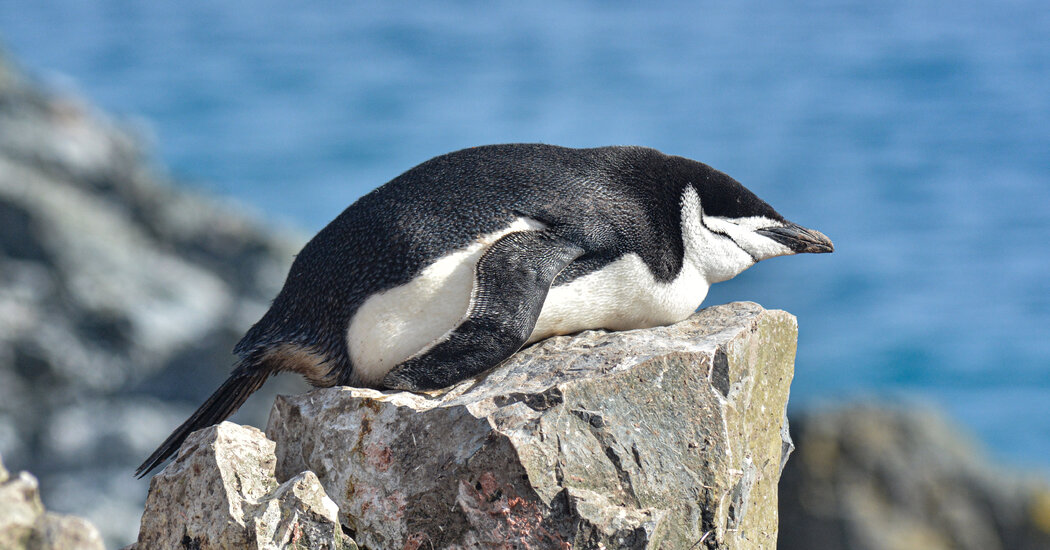Penguins are champions of energy naps. A brand new examine has discovered that over the course of a day, they go to sleep 1000’s of instances, with every bout lasting just some seconds.
Though animals have a variety of sleeping kinds, penguins simply break the report for interrupted sleep.
“It is actually uncommon,” mentioned Paul Antoine Lebourel, a neuroscientist on the Heart for Neuroscience Analysis in Lyon, France, who helped make the invention. “This highlights the truth that we do not know a lot about sleep, and that not all animals sleep like we learn in textbooks.”
the Stady It was printed Thursday within the journal Science.
Sleep science started within the early 1900s when researchers used electrodes on the scalp to find that individuals produced sluggish mind waves when sleeping.
They discovered related wave patterns in mice, pigeons and different captive animals. Over time, scientists found that just about all the animals they studied spent a while every day unresponsive to their setting. Even jellyfish sleep regardless of their lack of a mind.
however how Animal sleep varies lots. The brown bat sleeps for 20 hours a day, whereas giraffes sleep for lower than two hours. Human brains shut down fully once we sleep, whereas seals can shut down one facet; With the opposite staying awake, they’ll proceed swimming whereas they sleep.
As technological gadgets have turn into smaller and extra highly effective, researchers have found that documented sleep patterns in animals in captivity differ considerably from these noticed within the wild. In zoos, for instance, sloths sleep for about 16 hours a day. However within the rainforests of Panama, scientists seen that the animals had been sleeping Less than 10.
In 2019, Dr. Leporell and his colleagues tracked sleeping animals in an much more distant setting: King George Island, simply 70 miles north of Antarctica.
Received Younger Lee, a researcher on the Korea Polar Analysis Institute, invited the group to accompany him to the island, the place 1000’s of pairs of chinstrap penguins collect in nesting colonies to boost their younger. In December 2019, researchers outfitted the penguins with electrodes and different sensors that recorded their exercise for as much as 11 days.
Birds divide their time between swimming within the ocean and staying in nests to maintain their eggs and chicks heat. Between every journey to the ocean, which takes about 9 hours, the penguins spend a mean of twenty-two hours taking turns caring for his or her younger.
The examine discovered that whereas within the ocean, the birds barely slept, spending solely three % of their time resting on the ocean floor.
When the penguins returned to their nests, their mind waves slowed to a sample typical of sleeping birds, however just for a couple of seconds. They awoke once more, solely to return to sleep. Throughout this cycle, the birds accelerated 600 instances per hour.
People also can expertise such a partial sleep, though it often happens after they’ve did not get a very good night time’s relaxation. It may be harmful, particularly if we’re sitting behind the wheel of a automobile. However for chinstrap penguins, cautious sleep is the rule.
Dr. Leporell speculated that their sleep patterns mirror the tough situations through which they sleep. Penguin colonies are noisy and crowded, with birds consistently waddling forwards and backwards from the ocean. The habitat can be harmful: At any second, a gull-like chook referred to as a brown skua would possibly dive into the nest and eat the eggs or chicks.
The truth that penguins handle to sleep a lot regardless of all this disturbance suggests to Dr. Leporell that partial sleep gives some important advantages. Scientists have steered many potential advantages of sleep. Some imagine that the mind wants it with a purpose to do away with mobile waste, whereas others imagine that the sleeping mind adjusts its mobile communications.
However Vladislav Vyazovsky, a neuroscientist on the College of Oxford who was not concerned within the analysis, puzzled to what extent penguins profit from transient sleep intervals. He mentioned it is doable that we is perhaps eager about sleep in reverse. This can be the animal’s mind’s default setting, and scientists should attempt to clarify why animals get up after they do.
“You spend your life sleeping, and you then get up when it is advisable,” Dr. Vyazovsky mentioned.

